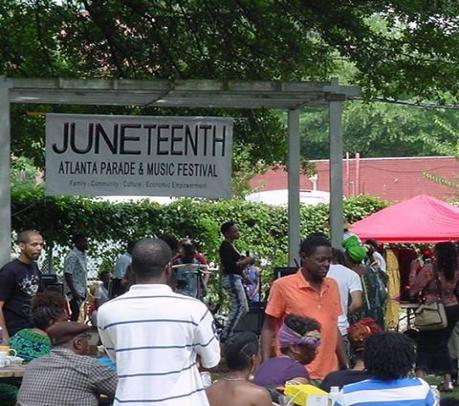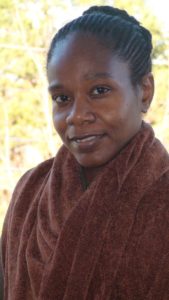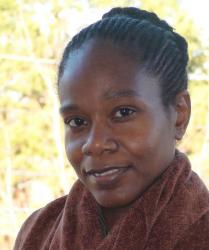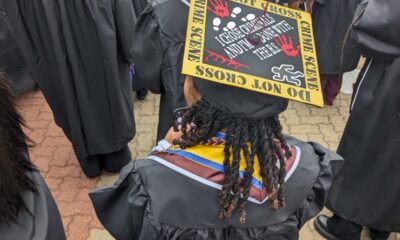News
Juneteenth: Black America’s Second Independence Day

 Deborah Evans was 43-years-old and a grandmother when she learned what a slim percentage of America’s black population already knew – that for African Americans there was a second Independence Day.
Deborah Evans was 43-years-old and a grandmother when she learned what a slim percentage of America’s black population already knew – that for African Americans there was a second Independence Day.
It came decades after the first one and began on June 19, 1865 when the abolition of slavery was announced in Texas, the last state in rebellion after the end of the Civil War. More than 2,000 Union soldiers had to fight to enforce the Emancipation Proclamation to free the remaining slaves in Galveston, Texas.
It was almost two and a half years after President Abraham Lincoln signed the Emancipation Proclamation. And from that proclamation, came the holiday Juneteenth (“June” and “nineteenth”), the annual celebration of emancipation from slavery in the United States. Yet many African Americans know nothing of this celebration of freedom.
And Evans said for a longtime she was one of them.
“We really did not teach black history in the schools,” Evans, 67, said. “We didn’t cover the 250 years of slavery or the 150 years since.”
The silence was re-enforced by her family who in the mid-to-late 1920s moved from the south to various states including Chicago where she was raised.
“They didn’t talk about slavery. They didn’t talk about freedom. There was no information about Juneteenth in the family.”
They also didn’t talk about the family’s history, and years later Evans learned why after her grandfather asked her to research the family history. About 10 years into her research, she discovered she had at least five cousins who were lynched in Tennessee.
Her family didn’t want to be reminded of their painful past, she said. So, Evans, who is still researching her genealogy, didn’t learn about Juneteenth until 2003. It was nine years after the Modern Juneteenth Movement began in 1994. Then a group of Juneteenth leaders from across the country gathered in New Orleans, La., at Christian Unity Baptist Church to solidify the one day African Americans would celebrate their freedom.
After this meeting, several national Juneteenth organizations were launched including the National Association of Juneteenth Lineage (NAJL), the National Juneteenth Observance Foundation (NJOF) and the National Juneteenth Celebration Foundation (NJCF) founded by Ben Haith, the creator of the National Juneteenth Flag.
In 1997, with the help of NAJL’s President, Lula Briggs Galloway, and its Chairman, Rev. Ronald V. Myers, Sr., M.D., the U.S. Congress officially passed historic legislation recognizing Juneteenth as “Juneteenth Independence Day” in America, according to the NJOF.
Now, 45 states recognized Juneteenth as a state holiday, said Myers, NJOF’s founder and chairman. He said the knowledge of the celebration depends on where you were raised. Juneteenth is known mainly in the hoods of black America, Myers, 61, said.
“It’s where a lot of us are poor, but maintain our culture. It’s a grassroot celebration,” Myers said. “Remember you’re not taught about it in school. You’re only taught about the Fourth of July.”
Myers said he knew about Juneteenth since he was a teenager growing up in Milwaukee where they had one of the largest celebrations with music, food and the reading of the Emancipation Proclamation. Some celebrations also included the raising of the Juneteenth flag, which Haith created in 1997.
But, for Myers and Evans it’s not enough. They want to see Juneteenth become a federal holiday on par with Flag and Patriot days. They want to see it on all the calendars and are urging President Donald Trump and Congress to approve the observance.
“July Fourth is known as the day this country became free. But then black people were not free,” said Evans who joined Myers earlier this years his director of communications in Las Vegas, Nev.
“We got our freedom in 1865,” Evans said. “It was our second Independence Day so it’s important.
“We want recognition of our independence, recognition of our freedom,” Evans said. “It’s not a civil rights issue, it’s a human rights issue.”
Evans want her grandchildren and great grand-children to learn in school what she had to find out on her own.
“It wasn’t rewritten, it was just ignored,” said Evans who went to public schools, a Catholic school and a city college in Chicago. “It wasn’t taught or emphasized.”
Still, she understood, “the survivors are the ones who wrote the story. We were a subscript.”
Jabril Waajid, who works with the Juneteenth Atlanta Parade and Music Festival, said the omission of black history in the school was deliberate. The system was set up to keep black people ignorant of who they are, he said.
Like Evans the 44-year-old learned about Juneteenth on his own. But for him, the spark to learn the truth wasn’t lit in America. It was in Saudi Arabia. Waajid, born and raised Muslim, visited the country with his mother as part of the Hajj, an annual Islamic pilgrimage, when he was around 35 years old. He learned that blacks, though born and raised in Saudi Arabia, were not considered citizens. Waajid became upset as he watched the black women, who had been impregnated and abandoned by Saudi men, struggle to survive by selling clothes and accessories on the street.
“They were selling merchandise on the ground; their babies in straps, or crawling on the ground,” Waajid said. “That stayed with me, wanting to find out about the history of how they migrated to that area.”
His curiosity led him to learn more about the history of black people. Then he learned about Juneteenth.
Waajid’s brother-in-law, Bob Johnson, founded Juneteenth Atlanta six years ago. Johnson said he first learned about Juneteenth when his father was stationed at the army base in Arizona.
“It’s odd that it was widespread in Arizona where there was a low African American population,” Johnson said. He said even Hispanics and people from other nationalities attended the celebration. “Everyone went, it was such a fun time.”
But the years passed and Johnson, who had since moved to Georgia, forgot about Juneteenth. Then one day he was attempting to book a date for his natural hair show when he learned the only date available was June 19th. He googled it to make sure no other event would be on the same day and his search brought him to Juneteenth. He decided to make the celebration a part of his show.
“When we started with this, it was against the grain,” Johnson said. “It was hard to find anyone to talk about this.”
His first show, Natural Hair Juneteenth Show, failed. “I didn’t realize that Juneteenth was so unknown to so many.”
Then the idea came to him, the event should be just Juneteenth.
“Underneath the umbrella of Juneteenth is everything to do with us,” Johnson said. “It’s about our history, about our art, about economics, music, genealogy. The freedom to do anything you can imagine. Anything you can see, anything you can envision, you can do it.”
Now Johnson wants to host the biggest Juneteenth celebration in the southeast and believes Atlanta is the best venue. After all, he said, it’s the home to several Civil Rights leaders and activists and the base of the nation’s largest international airport, the Hartsfield-Jackson Atlanta International Airport.
Last year, 5,000 to 6,000 people from various southern states attended the parade and music festival. This year Waajid said they expect as many as 10,000.
Johnson said one of the highlights will be the parade that involves 12 floats.
“The parade is to show black history in its entirety,” Johnson said. “Pre- and post-slavery, to show all the great achievements that have happened. To show these youths that this is their inheritance.”
The event, which is from Friday to Sunday, will showcase historical figures such as Harriet Tubman, Madame C.J. Walker and Sojourner Truth with re-enactments of their characters. But the central figure will be Fannie Lou Hamer, the mother of voting rights. Last year, it was Muhammad Ali.
Waajid said he wasn’t surprised to learn that the ignorance about Juneteenth and black history was so widespread. He hopes that will change soon, especially among the young.
“Knowledge of oneself is important,” Waajid said. “To know who you are and where you come from is important. Every other race is aware of their culture, but that was taken away from us and it’s to our demise.”
Waajid blames dysfunctional homes with mothers left to raise children on their own; blacks fighting among themselves, and many others trying to imitate people who aren’t like them.
He said there are individuals who try to make a difference and initiate a change in the community.
“But collectively as a people, it’s not there and it’s a reflection of slavery and what we’ve been through. It’s hard to break the barrier psychologically, especially if you don’t know that.”
But bridging the gap may not be so easy, especially with the younger generation.
Joshua Gause has always been interested in black history. The 23-year-old learned one of his first lessons when he was around six or seven. The teacher was his grandmother. Gause had returned to his home in Poughkeepsie, New York with his ears pierced after staying with his uncle for the summer in Atlanta. His grandmother was upset.
“Do you like them,” she asked the child, pointing to his pierced ears.
Gause didn’t hesitate. “Yes,” he told her.
“Do you know where the piercing of the ears come from?”
Gause hesitated. He didn’t know.
“That’s what they used to mark the slaves if they ran away,” she said. That lesson stayed with Gause.
Perhaps the passion to learn more came from his grandmother, but Gause was always digging for the truth about his history. He heard about Juneteenth for the first time when he took a Black Studies class in high school. He never forgot that there were about five students in the class. He heard about it again as a sophomore at Pine Manor College in Boston, Massachusetts when he signed up for an African American Art and Literature class.
“It was a part of history that was always left out, even though we were a part of it,” Gause said. “I always wanted to know where the decline for us as a people began. How we are treated, how they talk about us. I felt like people weren’t trying to tell us stuff about us.”
Though Gause knew about Juneteenth, he didn’t realize that so many states celebrated it. Still, he said, it didn’t matter.
“I personally wouldn’t celebrate it because I wouldn’t know what I would be celebrating,” Gause said. “Slavery was abolished almost 200 years ago, but I don’t see much progress. We are still treated like the bottom.”
Kimathi Lewis is a veteran journalist with more than 20 years of experience writing for national and local publications. The Clark-Atlanta University honor graduate has written for Upscale magazine, The Atlanta Journal-Constitution, and The Plain Dealer in Cleveland. Lewis founded Nature Kleen, a company built on her commitment to the environment and sourced by products she created. But, her passion for reporting crime and investigating injustice led her back to journalism.

-

 Featured10 months ago
Featured10 months agoCalifornia Is the First State to Create A Public Alert for Missing Black Youth
-

 Featured10 months ago
Featured10 months agoAfrican American Leaders Stay the Course Amid Calls for President Biden To Bow Out of Race
-

 Featured10 months ago
Featured10 months agoThe Debate Fallout Lands on Both Candidates
-

 Featured9 months ago
Featured9 months agoPresident Joe Biden Decides to Withdraw from the Presidential Race
-

 Featured9 months ago
Featured9 months agoIn One of His Final Speeches as President, Biden Says It’s Time for ‘Fresh Voices’
-

 Featured9 months ago
Featured9 months agoPresident Joe Biden Describes Shooting of Donald Trump As ‘Sick’









